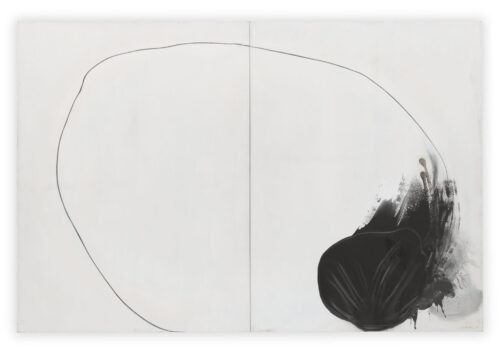
Virginia Jaramillo
“Neither happiness, nor safety and security, nor even material comfort has been realized. In few periods of human history have so many millions of persons been so unhappy, so insecure, so hungry and destitute, as at the present time, all the way from China to Western Europe.”
Pitirim Sorokin (The Crisis of Our Age, 1941)
“Without a doubt the preeminent reason that [Adorno’s] work must now be of vital concern in the United States is for what precisely can be learned from a nation that has so palpably entered primitive times.”
Robert Hullot-Kentor (Things Beyond Resemblance)
“For this cultural climate also forecloses, as a matter of political necessity, any attempt to notice realities that happen not to accord with socially acceptable consensus.”
Mary Harrington (Mystifying Appearances, Røyst 2025)
“The famous saying of Huey Long’s, that if there ever should be fascism in America, it would be called antifascism goes for all of his kin. The American attack on democracy usually takes place in the name of democracy.”
Theodor Adorno (The Psychological Technique of Martin Luther Thomas’s Radio Addresses)
The importance of culture and aesthetics to contemporary political life is hugely and critically undervalued. The outsized role that Hollywood plays is probably unprecedented both in the extent of it’s influence and also in the quality and meaning of its influence. Young men and women learn how to grow up by watching Brando or John Wayne or Lancaster or Bogart or Spencer Tracy– or Bacall or Rita Hayworth, or Julie Christie. We all learn of desire and we imitate this and try to absorb its meaning, its aesthetic dimensions — and so the erosion of Hollywood, even if always bad to some degree, or a large degree, is now something abject and nihilistic. And of course the American viewer learns of history from Hollywood, too, and learns who its enemies are and will be, and used to be. The manner of imparting historical lessons is really insidious, actually. Hollywood is, essentially, a giant propaganda machine. Entertainment, as a concept, is perilously close to propaganda or brainwashing even (which as a term reached its peak in the 50s).
“The idea of the leader, as contrasted with that of princes or feudal lords, emerged with the rise of modern democracy. It was related to the political party electing those whom it entrusts with the authority to act and speak in its behalf and who are, at the same time, supposedly qualified to guide the rank and file through rational argumentation. Since Robert Michels’ famous Soziologie des Parteiwesens, political science has clearly demonstrated that this classical, Rousseauistic conception no longer corresponds to the facts. “
Theodor Adorno (Democratic Leadership and Mass Manipulation, 1950)

Takesada Matsutani
The above quote from an obscure paper Adorno wrote in 1950, in English, for an American non specialist audience. Its about as simple as he ever got and one of the few times, or maybe only time, he ever directly discussed electoral politics at this level.
“This educational ideal of hardness, in which many may believe without reflecting about it, is utterly wrong. The idea that virility consists in the maximum degree of endurance long ago became a screen‐image for masochism that, as psychology has demonstrated, aligns itself all too easily with sadism. Being hard, the vaunted quality education should inculcate, means absolute indifference toward pain as such. “
Theodor Adorno (Education After Auschwitz)
Adorno says an important thing about pedagogy in this later essay, an essay he wrote after returning to Germany. He says leadership is itself a form of pedagogy and pedagogy itself is a form of leadership. Now before continuing along this path, allow me a digression of sorts, because I suspect its not really a digression at all.
“Our misunderstanding of fascism can be demonstrated by the results of a study by Yaroslavl psychologists A.A. Smirnov and E.V. Solovieva. They were looking for factors influencing the possibility of blocking the “fascistization” of a personality (fascistization is the formation of personality traits that are relatively close to or coincide with the features of fascist ideology). Based on the generally accepted idea that fascism is associated with a state of emasculation of emotionality, the “soulless” machine-like nature of an individual, the researchers assumed that empathy can block “fascistization”. However, the actual result of the study turned out to be different: empathy does not block, but to a certain extent, on the contrary, facilitates the fascistization of a personality [Smirnov, Solovieva 2020; Smirnov, Solovieva 2021]. Despite the fact that this seems impossible from a theoretical point of view and contradicts our moral consciousness, this is not an accidental artifact of the study. Let us confirm this at least by the fact that the systemic fascisation of the Ukrainian population that has been going on since 2014 (the facts of such a process are too numerous to deny) does not lead to the loss of the traditional Ukrainian mentality of “soulfulness” and sentimentality.”
M. I. Yanovsky {Yanovsky Mikhail Ivanovich} (On the Psychological Nature of Fascism)

Portrait of Pope Adrian VI. Artist unknown, 1630.
Yanovsky notes that Ukrainians, the far right racist Nationalists, are very good at presenting themselves as victims. It is similar to Zionist pathological victimhood. The Banderites, even within Ukraine, present themselves in maudlin and highly sentimental fashion.
“The opposition of liberalism and fascism is practically universally accepted. However, in our opinion, it is a consequence of the shift in the understanding of fascism from its essence to an important, but particular manifestation. Thus, absolute power was also in monarchies (the French kings Louis, the Spanish kings, Genghis Khan, etc.). But it is obvious that absolute monarchical power is not fascism. A more substantiated point of view is that the original idea of fascism is the postulate of an a priori, unconditional inequality of people [Kara-Murza 2008]. Thus, the doctrines of fascism are characterized by the division of people into “people” (or “superpeople”), “subpeople” and “antipeople”; there are higher nations (people and superpeople) and lower nations (subpeople and antipeople). Since this division is not relative, situational, but rather basic, i.e. absolute, it is proclaimed as biological. For example, D. Dontsov, the creator of the Ukrainian version of fascist ideology – the so-called “Ukrainian integral nationalism”, in one of his works claims that Russians (“Muscovites”) are not a people, but a biological species (race), located at a subhuman level. (Dontsov is the ideological basis of the Bandera movement; in modern Ukraine he is considered an outstanding national thinker; streets in 12 cities of the country are named after him.”
M. I. Yanovsky {Mikhail Ivanovich} (Ibid)
It is important that Yanovsky identifies this false opposition between liberalism and fascism.
“Fascism can be accompanied by the concentration of power and control, using an authoritarian state as its “case”. But it also turned out to be compatible with liberalism; liberalism does not reject it as some kind of foreign body. For example, in the USA, fascist ideology is acceptable under the pretext of “freedom of speech”. In 2014, Ukrainian neo-fascists and liberals found a “common language” to commit a coup d’etat. Therefore, it is obvious that liberalism is not the antipode of fascism. Liberalism and fascism even agree on some common values – for example, competition, with the difference that fascism declares competition between races [Kara-Murza 2008]. Moreover, according to S.G. Kara-Murza, fascism in a certain sense is a continuation of liberalism: “fascism brings the liberal idea of competition to its logical conclusion ” [Kara-Murza 2008, 24], understanding man in a biologizing way, as a predatory animal. That is, the common idea of both is social Darwinism.”
M.I. Yanovsky (Ibid)

Alan Green
And here we arrive at the confusion of the U.S. populace regards both fascism and liberalism (and democracy). Trump is called fascist by liberals, and liberals are called communists by fascists. Adorno said (often quoted) that ‘liberalism is the handmaiden of fascism’. And this segues nicely back to questions of culture and taste and art. The most sentimental kitsch tends toward the reactionary almost regardless of the content. The form of the sentimental, the style markers, the sensibility of the maudlin victim is one closely linked to fascism. And closely linked to resentment, I think, and to libidinal blockage of sorts. The sentimental fascist is the pre-mature ejaculator, the impotent, the germ freak.
“The “Victim” is not alien to empathy. The self-pity of the “Victim”, without changing its essence, can expand and spread to the collective “I”, to “our own”. This is how empathy arises. Obviously, this kind of empathy is the basis of group egoism and is quite compatible with aggressive opposition to “strangers”.”
M.I. Yanovsky (Ibid)
The victim rights movement poached much of this dynamic. The elevation of the status of ‘victim’ became, in the West in particular, something akin to an immaculate conception, a child-king. The victim is official, is sanctified and hence reborn. The popularity of the term ‘survivor’ speaks to this. Cancer survivor, rape survivor, incest survivor etc. The survivor is the child chosen by the Dalai Lama as future spiritual leader. The *victim* is simply justified. And in Hollywood, the adoration of militarism, (tactical cool) is linked to adoration of a Christian sort, and to what Yanovsky is suggesting as an ersatz empathy. This new jingoism is tinged with a quality of self pity, too. There is rarely a story of a returning vet that does not include a back story necessitating he or she be sympathized with because of his or her battle traumas. And I found the interesting, but logical, plot formula that included parents or grandparents having Alzheimer’s as a B story. Its unconscious ‘ageism’, but it is more than that. One must ask why ‘ageism’ exists? Why it is becoming more widespread? But in terms of the aforementioned ideal plot, the victim (returning vet) needs a parent or grandparent suffering dementia to elicit *sacrifice*.
“The real antipode of fascism, which is certainly incompatible with it, are ideologies that proclaim the natural (or spiritual) equality of people and the unity of humanity. Such are the world religions – Buddhism, Christianity. But first of all, this applies to communist ideology. It is no coincidence that after the Second World War, the adherents of fascism never sought (there were no exceptions!) to save themselves in the USSR. This was not hindered by Soviet “totalitarianism”, but by the absolute alienness of fascist and communist ideologies. As is known, they found refuge both in the dictatorial regimes of Latin America and in the liberal USA and Canada.”
I.M. Yanovsky (Ibid)

Luc Tuymans (1988)
The relatively sudden appearance of dozens of Alzheimer’s subplots suggests the unconscious of Hollywood executives. The majority of these stories involve family members (cop’s father suddenly has dementia, detective of homicide’s grandmother diagnosed, etc etc). This runs alongside the use of the term ‘boomer’ as a pejorative. I remember when I first experienced that, on social media, and you get it a lot from the gay community (thinking mostly of the U.S. here) because of their youth obsessive subculture. ‘Boomer’ is a pejorative, now, on social media. Blame ‘boomers, the near elderly, for all contemporary ills. The blame that the elderly, or near elderly, for the debt of the U.S. as well as the debt culture of which everyone is a part, seems now a well entrenched trope. Blame ‘boomers’ for the crumbling infrastructure, for obesity and the mental health crisis. The resentment toward ‘boomers’ is encouraged by the propaganda arm of the government. It’s another of those ‘Ouroboros’ mini-narratives Madison avenue so loves. One must hate and engage in some kind of psychological parracide. The insistence upon societal ‘own goals’. It is a collective sacrifice of sorts. There is a unity achieved to have the culture see itself as devouring itself. And curiously enough, I just tripped across an interview with Carl Jung, from the end of WW2, and in it he mentions Ouroboros as well. (hat tip /Lena Bloch, who posted it on Medium)
” Here you must allow me to go back a bit and to recapitulate my theory as to the general psychic antecedents of this National Socialist war. Let us take a small practical example as a starting point. One day a woman comes to me and breaks out into the wildest accusations against her husband : he is a veritable devil who torments and persecutes her, and so on and so forth. In reality the good man is a perfectly respectable citizen, quite innocent of any such demonic intentions. Where does this crazy idea come from in this woman? It is the devil in her own soul that she is projecting; she has transferred her own wishes and her own rages to her husband. I make this clear to her; she admits it and becomes a contrite little lamb. Everything seems to be in order. And yet that is just the thing I find most disquieting, because I don’t know where the devil, who had previously attached himself to the image of the husband, has gone to. Exactly the same thing happened on a large scale in the history of Europe. For primitive man the world is full of demons and mysterious powers which he fears; the whole of Nature is animated by these forces, which are nothing but man’s own inner powers projected into the outside world. Christianity and modern science have de-demonized Nature, which means that the European has consistently taken back the demonic powers out of the world into himself, and has steadily loaded his unconscious with them. Out of man himself the demonic powers rise up in revolt against the supposed spiritual constraints of Christianity. The demons begin to break out in Baroque art: the columns writhe, the furniture sprouts satyr’s feet. Man is slowly transformed into a uroboros, the “tail-eater” who devours himself, from ancient times a symbol of the demon-ridden man. The first perfect example of this species was Napoleon. The Germans display a specific weakness in the face of these demons because of their incredible suggestibility. This shows itself in their love of obedience, their supine submission to commands, which are only another form of suggestion. This hangs together with the general psychic inferiority of the Germans, the result of their precarious position between East and West. Of all the Western peoples, they were the ones who, at the general exodus from the Eastern womb of the nations, remained too long with their mother. “
Carl Jung (interview by Peter Schmid was published in Die Weltwoche Zurich, 1945)

Alex Burke, photography (Nunn, Colorado – January 2021)
Jung is, as usual, both insightful and wrong. Science has not exactly de-demonized Nature, not even in 1945. But I will return to that later.
“Fascist consciousness also has cognitive specificity – a unique way of thinking that corresponds to the described frame of mind. The specificity of thinking is due to the strengthening of the sense of personality. The fact is that the strengthening of the sense of personality is at the same time an experience of the limitations of one’s “I”. The experience of one’s limitations can fluctuate – from the feeling of oneself as a “little man” (correlating with the image of a “victim”) to the feeling of oneself as a “superman” (correlating with the position of a “punisher”). At both poles, there remains an enhanced sense of personality, its boundaries. But this limitation carries inequality as an initial cognitive principle: limitation is always “I” that is either smaller or larger than others.”
I. M. Yanovsky (Ibid)
This is something Reich noted, this cultish attachment to personality. Today, however, it is far more deeply embedded in the culture. Slavery, was of course, just one result of this personalitized view of the world. The fascist impulse, the fascist mythos, needs an ‘other’. And it needs aesthetic confirmation in a sense.
“This is the mysterious paradox: the “great-grandfathers” of fascism are the ideologists of liberalism. Therefore, the well-known concept of “totalitarianism”, which, according to the idea of its creators H. Arendt, Z. Brzezinski and others, encompasses fascism and communism and fixes their connection, is apparently a product of the same cognitive deformations and simplifications.”
I.M. Yanovsky (Ibid)
Hollywood’s love of vigilantism is another example of this need for a personality that establishes ‘difference’. And it is my considered opinion here that vigilantism, and its popular durability, is because the American soul has always been activated by the desire (need) to clean up the mess that others have made (Trump very clearly is motivated by this). Well, to first see the mess as ALWAYS made by ‘others’. Clean up the ‘other’s’ mess. (I mentioned Arthur Bremer last post, but most serial killers or spree killers or lone assassins are subject to this cosmic form of re-balancing). This very American figure: the powerful no bullshit straight talker, a judge or cop, or a High School football coach — putting things in order and ‘cleaning house’, runs through popular culture. This is one of the legacies of Puritanism. And this anal retentive and sadistic personality is and overlaps with, often, the ADHD personality, or the OCD personality. Cotton Mather is not unlike Keir Starmer or Marco Rubio. They replace reflection with self pity, as Yanovsky notes. Starmer or Elon Musk or Bezos all must see their mission as one of cleansing. It is possible that all sadists see their compulsions as moral janitorial work. The sheer grotesque aesthetics of Trump’s inauguration speaks to dynamics of white sacrifice, and white sadism.

Oskar Schlemmer
“Hence the Germans are profoundly troubled with a national inferiority complex, which they try to compensate by megalomania: “Am deutschen Wesen soll die Welt genesen” (Roughly, “the German spirit will be the world’s salvation.”). A Nazi slogan derived from a poem by Emanuel Geibel (1815–84) — though they are none too comfy in their own skins! It is a typical adolescent psychology, apparent not only in the extraordinary prevalence of homosexuality but in the absence of an anima figure in German literature (the great exception here is Goethe). It is also apparent in German sentimentality and “Gemuetlichkeit,” which is really nothing but hardness of heart, lack of empathy and soullessness. All those charges of soullessness and bestiality which German propaganda leveled at the Russians apply to themselves; Goebbels’ speeches are nothing but German psychology projected upon the enemy. The immaturity of the personality also displayed itself in a terrifying way in the German General Staff, whose lack of character resembled the squashiness of a mollusk inside his shell. Germany has always been the land of psychic catastrophes: the Reformation, peasant wars and wars of religion. Under National Socialism, the pressure of the demons became so great that they got human beings into their power and blew them up into lunatic supermen, first of all Hitler, who then infected the rest. “
Carl Jung (Ibid)

Mikhail Karasik, montage.
In contemporary life the role of entertainment, at least in terms of film and TV, is closely aligned with pedagogy today. And cutting across all of these topics is *porn*.
“What is obscene about pornography is not an excess of sex, but the fact that it contains no sex at all. Today, sexuality is not threatened by that “pure reason” which puritanically avoids sex as something “dirty,” but by pornography. Porn is not sex in virtual space. Today, even real sex is turning into porn.”
Byung Chul-Han (The Agony of Eros)
So while the fascist subjectivity demands an absolutization of inequality, the nature of the ‘other’ is or has changed. The ‘other’ itself is now generalized. Some of this can be attributed to the sheer scale of narcissism in the contemporary Western society. But while birth rates fall, and fewer people in the West are having sex, they ARE however watching porn. Wilhelm Reich remains essential for understanding the sexual harm caused by capitalism.
“In a society where everyone is an entrepreneur of the self, the economy of survival reigns. It stands diametrically opposed to the non-economy of eros and death. Neoliberalism, with its uninhibited ego- and achievement-impulses, constitutes a social order from which eros has vanished entirely. “
Byung Chul-Han (Ibid)
Now Byung Chul-Han relates comments made by Chris Anderson, the editor of Wired. I should not be surprised but naif that I am, I was indeed surprised when reading this. This is important, however. This is how, I would argue, all college educated white people think today. All scientists and tech people, engineers and coders et al.
“Chris Anderson—the editor-in-chief of Wired—published a provocative article entitled “The End of Theory.” In it, he claimed that the inconceivably large volumes of data now available have made theoretical models entirely superfluous: “Today companies like Google, which have grown up in an era of massively abundant data, don’t have to settle for wrong models. Indeed, they don’t have to settle for models at all.” Instead, they analyze data for patterns of affinity or dependency. The hypothetical models of theory are to be replaced with the direct comparison of data. Correlation is more important than causality: Out with every theory of human behavior, from linguistics to sociology. Forget taxonomy, ontology, and psychology. Who knows why people do what they do? The point is they do it, and we can track and measure it with unprecedented fidelity. With enough data, the numbers speak for themselves.”
Byung Chul-Han (Ibid)

Daniel Firman
You can hear something else in Anderson’s tone. You can hear the diluted residue of that tough talking Puritanical Christian football coach, the no-nonsense rancher or cop or DA. Who cares why people do what they do. Right? Who cares. Anderson loves saying that I am sure. Who cares why, they just do it. I am certain he loves saying that. He loves seeing himself as this moral waste disposal engineer. Nothing matters but data.
But this is also the new fascism. These bloodless proles who stalk the internet and provide commentary at outlets like Wired. Liberal. Who cares why. They just do; add it up, correlate and viola, you can see the earth is warming and its about carbon, and oh, this will help with predictive policing. People just do it, but we have the numbers, we have the data. The data proves it. Doesn’t matter what *it* is, the data is objective. And we can correlate in a nano-second. Data, and we can game it, too. Game it to death while we’re at it. One can begin to see how appealing the idea of computer models are for people raised in this system. I have noted a decided hostility to theory in the U.S. (especially) increasing over the last thirty years, say — American anti-intellectualism has always been there, of course, but the ascension of data, of simply quantitative processing eclipsing all else, feels like a threshold.
“Suppression of the natural sexuality of the child, particularly of its genital sexuality, makes the child apprehensive, shy, obedient, afraid of authority, “good” and “adjusted” in the authoritarian sense; it paralyzes the rebellious forces because any rebellion is laden with anxiety; it produces, by inhibiting sexual curiosity and sexual thinking in the child, a general inhibition of thinking and of critical faculties. In brief, the goal of sexual suppression is that of producing an individual who is adjusted to the authoritarian order and who will submit to it in spite of all misery and degradation. At first, the child has to adjust to the structure of the authoritarian miniature state, the family; this makes it capable of later subordination to the general authoritarian system.”
Wilhelm Reich (The Mass Psychology of Fascism)
“Data-driven, positive science produces neither insight nor truth. Information is only cognized. But cognition is not yet recognition—that is, insight. Because of its positivity, it is additive and cumulative. As positivity, information changes nothing and announces nothing. It is utterly inconsequential. “
Byung Chul-Han (Ibid)

Chinese Government poster circa cultural revolution.
But there is something more in all this. Chul-Han (or is it Byung?) is correct, I think absolutely, but there is a further question having to do with why science took this path, this particular path toward instrumentality and positivism. The lack of understanding in the culture at large regards ‘information’ — this begs the question as to how and why. Why does a Chris Anderson believe data solves philosophy, in a sense. Or doesnt solve it but renders it obsolete. See, to answer that one must return to why audiences WANT a Zombie apocalypse. Why do people want The Walking Dead? We live in a society today that has been subjected to 80 years (or more) or intensive propaganda bombardment. Ninety percent of which is firstly anti-communist propaganda. The terror the Western establishment, the WASP ruling class, feels toward communism is profound. The WASP wealth that figured even Jews were better than commies and gave Palestine to a sociopath named Herzl. The very most wealthy in England and the US had decades of sleepless nights dreaming of Stalin and Mao, and later Fidel and Uncle Ho.
I am stunned of late, I admit, to watch how propaganda has a kind of ‘second life’. If the initial state deceptions are later debunked, the lies, the original lies remain like a ghost image. The story of the break up of Yugoslavia has been in the news, at least on social media, again. Piers Morgan rattled on about NATO protecting Kosovo or something. There are a half dozen books and lengthy articles that absolutely lay out the truth (Ed Herman at Monthly Review https://monthlyreview.org/2007/10/01/the-dismantling-of-yugoslavia/ is a concise overview for openers. But George Szamuely’s Bombs for Peace, Parenti’s To Kill a Nation, and Diana Johnstone’s Fools Crusade are excellent. I even wrote a piece a decade back https://dissidentvoice.org/2016/04/controlling-history-the-sordid-story-of-the-international-tribunal-for-yugoslavia-and-nato-aggression/) The story is out there, the facts were laid out in open court for the most part, but the media stopped covering the ‘trial of the century’ once Milosevic shredded the prosecution’s case. Milosevic was acquitted eventually. The original Clinton administration lies live on, however, as a ghost image — the original effect of those lies was deep and seemingly indelible and impervious to factual correction, and today such ghost images haunt the culture.
“Data-driven, positive science produces neither insight nor truth. Information is only cognized. But cognition is not yet recognition—that is, insight. Because of its positivity, it is additive and cumulative. As positivity, information changes nothing and announces nothing. It is utterly inconsequential. In contrast, insight is a negativity. It is exclusive, exquisite, and executive.”
Byung Chul-Han (Ibid)

Deborah Turneville, photography.
Here there is an interesting paradox, if that’s what it is. This new fascism that absolutizes inequality at the same insists on an ‘othering’, on the shadow opposition, as it were. It is ‘our’ shadow, but it is operatively ‘other’. Alien. Different. And inferior because our ego demands that.
Byung Chul-Han quotes this: “What does friend mean when it becomes … a condition for the exercise of thought? Or rather, are we not talking of the lover? Does not the friend reintroduce into thought a vital relationship with the Other that was supposed to have been excluded from pure thought?”
Deleuze & Guattari (What is Philosophy?)
Western Imperialist society has radically devalued ideas such as friendship and love. Neo-liberalism instinctively, as an ideology, questioned ideas of sincerity, courage, honesty, truth, friendship, and love. Irony grew in parallel with these ideological assaults. Post structuralist academia is often attacked for its empty jargon and obfuscation. But this emptiness went far beyond post structuralism.
“Today, the volume of data and information, proliferating without end, is pulling science away from thought on a massive scale. Information is inherently positive. Data-based, positive science (“Google science”), which amounts to merely balancing out and comparing data, is putting an end to theory of the emphatic sort. It is additive or detective—not narrative or hermeneutic. No narrative tension animates it. As such, it falls apart into mere information. In view of the pullulating mass of information and data, theories are now more necessary than ever. Theories keep things from running together and sprawling. That is, they reduce entropy. Theory clarifies the world before it elucidates it. Consider that theories and ceremonies (i.e., rituals) share an origin. They confer form on the world. They shape the course of things, framing them so that they do not overflow. In contrast, today’s mass of information is exercising a deformative effect.”
Byung Chul-Han (Ibid)

Mark Yankus
Stories. Rituals and ceremonies and theory all share origins, and all of them begin as theatre — data does not. Information technology has nothing to do with storytelling. And data and information do not even rise to the level of mythology.
“The displacement of philosophy by science has led, as we know, to a separation of the two elements whose unity, according to Hegel, constitutes the life of philosophy: reflection and speculation. The land of truth is handed over in disillusion to reflection, and speculation is tolerated ungraciously within it merely for the purpose of formulating hypotheses, which must be conceived outside working hours and yield results as quickly as possible. To believe, however, that the speculative realm has been preserved unscathed in its extra-scientific form, left in peace by the bustle of universal statistics, would be to err grievously. First, severance from reflection costs speculation itself dear enough. It is either degraded to a docile echo of traditional philosophical schemes, or, in its aloofness from blinded facts, perverted to the non-committal chatter of a private Weltanschauung. Not satisfied with this, however, science assimilates speculation to its own operations. Among the public functions of psycho-analysis, this is not the least. Its medium is free association. The way into the patient’s unconscious is laid open by persuading him to forgo the responsibility of reflection, and the formation of analytic theory follows the same track, whether it allows its “ whether it allows its findings to be traced by the progress and the falterings of these associations, or whether the analysts – and I mean precisely the most gifted of them, like Groddeck – trust to their own associations. We are presented on the couch with a relaxed performance of what was once enacted, with the utmost exertion of thought, by Schelling and Hegel on the lecturer’s podium: the deciphering of the phenomenon. But this drop in tension affects the quality of the thought: the difference is hardly less than that between the philosophy of revelation1 and the random gossip of a mother-in-law. The same movement of mind which was once to elevate its ‘material’ to a concept, is itself reduced to mere material for conceptual ordering. The ideas one has are just good enough to allow experts to decide whether their originator is a compulsive character, an oral type, or a hysteric. Thanks to the diminished responsibility that lies in its severance from reflection, from rational control, speculation is itself handed over as an object to science, whose subjectivity is extinguished with it.”
Theodor Adorno (Minima Moralia)
The problem of where science was headed, so to speak, has been thought about and theorized about for fifty years. The atom bomb sort of woke people up to a frightening shadow science just next door to *science* (think little smiley face emojis here), though Robert Louis Stevenson certainly was aware of, as were a half dozen others, at least, writing during Stevenson’s lifetime. The loss of sincerity and truth, of honour, as noted above has resulted in crippling psychic dullness, a lack of mental agility, a lack of long term perspective. Marcus Steinweg captures an aspect of this (and he is a very curious thinker who I find, at least readable) in one of his endless aphorisms.
“What is your aim in philosophy?” asks Wittgenstein in section 309 of his Philosophical Investigations, and answers: “To show the fly the way out of the fly-bottle.” What if the way out consists in knowing that there isn’t one? Maybe the aim of philosophy is to free oneself from the fantasy of a way out. Fantasies are always both the illusion of inescapability and the illusion of escape. Too infrequently does it become clear that inescapability and escape represent imaginary ways out. What people flee is their compossibility. It’s not about either inescapability or escape. It’s about realizing that inescapability itself is the escape. The aporia of philosophical as well as literary and artistic thought demands that we identify ourselves with the fly in the fly-bottle instead of showing it a way out. This is precisely what Kafka does.”
Marcus Steinweg (The Terror of Evidence)

John McLaughlin (1960)
Kafka. Science needs a Kafka. A Shakespeare or Dante. It needs someone. I’ve always noted the fascination that Oppenheimer held for people. (and for me, too, to be honest) and it was because in a world of chalk boards and endless equations and theorems and proofs — Oppenheimer was a poet, a strange seasonal communist and a man of singular taste down to the drape of his coats. That he knew the Bhagvad Gita is by itself sort of remarkable. There are something like twelve biographies on Oppenheimer and countless magazines articles. And now a movie (terrible as it was). But here again, Hollywood cannot grasp a story like J. Robert Oppenheimer. I always felt a certain synchronicity in the Manhattan Project AND Agnes Martin both being drawn to New Mexico. (well, and a host of other artists too, from Georgia O’Keefe to Susan Rothenberg).
More from that 1945 interview with Jung:
“The Germans today are like a drunken man who wakes up the next morning with a hangover. They don’t know what they’ve done and don’t want to know. The only feeling is one of boundless misery. They will make convulsive efforts to rehabilitate themselves in face of the accusations and hatred of the surrounding world, but that is not the right way. The only redemption lies, as I have already indicated, in a complete admission of guilt. Mea culpa, mea maxima culpa! Out of honest contrition for sin comes divine grace. That is not only a religious but also a psychological truth.”
Carl Jung (Ibid)
If the post WW2 Nazi population woke up after a black out, they would be encouraged to go to AA and tell them ‘I’ve hit rock bottom’. And the AA guy would find them a sponsor — say, like the EU, or WEF, and the U.S. would tell them to ‘work the system’. And you would have a dry drunk country waiting for a ‘slip’. And today the AfD sort of feels like the delivery system for a slip. But Germany today doesn’t need a slip. They are careening across the alley like a blind drunk ready to puke on your shoes.

March Avery
The aesthetic reflection of contemporary western society is one best described as autistic, and then sociopathic. There are no stories, and there is nothing that is not interrupted. Its like the world is full of only 8 year olds. The attention span of a hyper kinetic 8 year old. Or a smart goldfish. That no young man learns the aesthetics of and emotional dimensions of manhood from Ryan Gosling should be obvious. There is only this constant stream of counterfeit *authenticity*. The sense of an entire culture and society playing ‘dress up’.
And entertainment fields such as professional league sports have become entirely agent driven. Its marketing and rich owners moving their mobile plantations to places they like better, cities more congenial to marketing and sponsorships, e-commerce and endorsement opportunities. The recent Luka Doncic trade is nakedly about the LA market AND about race. Sports agents like Rich Paul and Klutch have far more power than any GM today. Teams have very little autonomy. The template of a WWE steel cage death match bleeds into all other sports now. Even college athletics is operated like a Hollywood studio. What was once, only a decade or two back, a refuge for those who wanted escape but hated Hollywood movies, is today itself a sort of Hollywood movie.
“There is nothing beyond the theater because there is nothing beyond the stage.”
Marcus Steinweg (Inconsistencies)
And in a related topic: it actually took me years (and years) to stop trying to fit together various thinkers and artists. Or to try and fit my thinking into something like a conventionally organized whole. Academia wants you to do it, though, and so people try. They simplify and make reductive very complex ideas that really cannot be kept within conventional bounds. Academia influences thought and it is insidious and harmful. I know because I tried.
My pedagogical advice is to read the thinkers you feel drawn to. Read the ones, too, you do not feel drawn to. Read the canon, but question the canon. I think, for example, that one must read Wittgenstein. I think one must spend a year, at least, reading nothing but Wittgenstein. I did that, in my twenties when I was a dishwasher and indigent in NYC — and it was hugely fruitful. I read Marx’s Capital in a group — over the course of a year. Very committed wonderful group. Literally nobody missed a single monday night. Until we finished. This is what people should do with great works. But if you spend a year with Wittgenstein do not expect that you can then find a neat puzzle like fit for his thought alongside Freud or Kierkegaard. There is so much to read. And I have spent my life reading, in a sense. And there is so much I have not gotten to.

Tobias Löhr, photography.
Finding teachers, mentors, is very difficult and that is part of the problem with contemporary culture. The credentialed educator is the only one approved. But even with credentials we have two or maybe three generations whose narcissism will not allow the search for teachers. That search was deformed into the ‘guru’ syndrome. The kitsch spirituality of new age ‘teachers’ — see Werner Erhard or L. Ron Hubbard, or even Jordan Peterson. Note that popularity is only bestowed on those with anti-communist sentiments. The New-Age spirituality was a part of the regression baked into the sixties. And it has survived now in unexpected ways. The current UFO discussion is a holdover from the health food store and natural fiber clothing. One is rarely allowed an agnostic position today on ‘news’ topics such as aliens. Social media fills in very nicely for the Inquisition. The entire moon landing hoax belief is linked to Zombie films and post apocalyptic themed films. The same desire (nearly) to start over bleeds into the belief (hope) that nobody got to the moon, its really not possible, and we should all start homestading (there is actually a new post apoc TV series called Homestead, but I’ve not seen it). The right wing today, those who still trust Trump and think Democrats are communists, tend to be closet accellerationists whether they know it or not.
Besides the narcissism, why is there such resistance to finding teachers or mentors today?. The answer is tied into Adorno and this idea of the dialectic of Enlightenment. Which means it is tied to regression.
“For Adorno asserts that history stands in thrall to regression—that progress necessarily reemerges as a vestige of the primitive—so long as the principle of history remains the domination of nature. And the claim to origin is itself the act in which domination insists that, where rights are to be determined, priority must be ceded to what has come prior. As Adorno writes in Negative Dialectics, the category of origin is the “seigniorial, the confirmation of him who stands first because he was there first; of the autochthon against the immigrant, of the settled against the migrant.” In the concept of origin, then, nature is dominated in its own name. To demonstrate this thesis in North America, Thoreau may be chosen from among many, especially since in a single sentence he ably carves to the exact point where the invocation of the primeval proves to be usurpation: “I wish to speak a word for Nature, for absolute freedom and wildness.” While this invocation of nature prepares the eye for the encompassment of trees, sky, and virgin field, it is the seigniorial tone of his absolute claim—echoing from the old world as it resounds afresh on untrodden continent—that deserves closest attention. By speaking in the name of origin, its freedom, its wildness, the newcomer to the woods establishes an inviolable right, as if the manor house of nature had always been his.”
Robert Hullot-Kentor (Things Beyond Resemblance)

Susan Rothenberg (1991)
It is important, then, finally, to grasp this Adorno-ean idea of regression as based in psychoanalysis.
“…psychological experience in which nothing is more obvious—however common sense balks at it—than that earlier and later are not spatially separate in the course of a life. The traumatic return of the repressed covers no spatial distance, but it does “arrive”—and with an uncanniness bearing an inescapable familiarity, as if it had always been in front of the mind’s eye where, in fact, it had always been, though without conscious perception. ”
Robert Hullot-Kentor (Ibid)
A final thought here regards both Trump and Biden. Alberto Toscano has a book, Late Fascism, published in 2023. And I will end here with a quote from it that touches on Adorno’s essays already mentioned, and the Freudian aspect of contemporary politics.
“The influence of Freud’s text was vast and variegated, but I want to consider it via a post-war text of Adorno’s, ‘Freudian Theory and the Pattern of Fascist Propaganda’ (1951), which may also be taken as a kind of corrective to the salvage readings of fascism advanced by Bloch and Bataille. The relevance of Adorno’s text is only increased by the fact that it relates to research – namely his own participation in the collective project on The Authoritarian Personality and the book by Löwenthal and Guterman on American fascist agitators, Prophets of Deceit – which have been justly recovered to illuminate the Trump ascendancy and related phenomena. Löwenthal and Guterman ground their critical theory of the fascist agitator in the emotionally and intellectually paralyzing disorientation that marks social life subsumed by capitalism and beset by ‘depersonalization and permanent insecurity’. They christen this condition as malaise, a kind of ‘eternal adolescent uneasiness’ to which the agitator ‘gravitates … like a fly to dung’. This malaise stems from a catastrophic impoverishment of the capacity for genuine experience, evidenced by the fact that ‘people have learned to live in patterns’ and tend ‘to accept uncritically entire systems of opinions and “and attitudes, as if ideological tie-in sales were forced upon them’, becoming ‘stereotyped appendages of this or that big cultural or political monopoly’. Where fascism in power exploits at an industrial scale ‘the connection between potential material poverty and real spiritual poverty’, the agitators of Prophets do so in what we could view as a more artisanal, if no less sinister, fashion.”
Alberto Toscano (Late Fascism)
To donate to this blog use the paypal button at the top of the page. Donations also help support the Aesthetic Resistance podcasts:

Some comments.
It is interesting to note that the Orange Oaf has appointed three very right-wing “ambassadors” to liaise with Hollywood Mel Gibson John Voight and Sylvester Stallone.
Gibson of course created the unspeakably vile sado-masochistic snuff’/spatter movie The Passion of Christ in which the ‘hero” representing every single human being and humankind altogether was systematically and “lovingly” beaten to death.
Are you familiar with the the 1951 essay by Adorno titled Freudian Theory & the Pattern of Fascist Propaganda – it is muchly relevant to the current situation.
Check out this item which features a positive review/endorsement of a book titled Unhumans. The person making the endorsement is none other than the benighted J D Vance
http://www.thenerdreich.com/inhumans-jd-vance-and-the-language-of-genocide
http://www.splcenter.org/hatewatch/2024/03/08/cpac-attendees-america-under-attack
It is interesting to note that in the recent past Mary Harrington has attended these toxic gabfests. She is probably still sympathetic with the world-view promoted at the gab-fests. Mary is also regularly featured on the very right-wing Unherd website the American correspondent of which is associated with the Federalist Society and Hillsdale College. The director of the Federalist is an Opus Dei propaganda hack. Hillsdale College has close links with Opus Dei. The principal movers and shakers of the notorious 2025 Project are Opus Dei operatives.
I forgot to mention that Vance is closely associated with Opus Dei.
This reference provides a critical assessment of the applied politics of Opus Dei.
http://opentabernacle.wordpress.com/2024/09/02/opus-deis-influence-on-project-2025
that adorno essay is mentioned in the final paragraph of this post (by toscano, but Ive written about before a couple times, I think). I suspect the podcast (ours) will dig into vance and peter thiel more soon. As for harrington, she is fascinating in some ways, but her essay (published in a norwegian lit mag for some reason) is pretty good. This new tech bro right wing is delusional…..and yet i cannnot help be feel twinges of pleasure not to hear from biden or kamala or obama et al anymore…for a while. I wrote a bit about opus dei years ago here https://john-steppling.com/2015/07/unstaging-or-how-i-learned-to-stop-worrying-and-love-world-government/
THAT i did not know. thanks.
Re Gibson’s the Passion of Christ please check out an essay by Douglas Kellner and Rhonda Hammer titled Critical Reflections on Mel Gibson’s the Passion of Christ – the theme is the applied politics of cruelty.
It is available via the UCLA School of Education & Information Studies.
It was originally published online by this Marxist Journal
http://logosjournal.com
I have come to agree that porn is not only unsexual but anti-sexual. In porn the natural essence of sex has been reversed. In real sex, the sense of sight serves as initiator in the first encounter of the potential partners. As they get to know each other, sight plays a diminishing role and finally becomes redundant when actual sex takes place and the couple are too close to see each other.
In porn this process is totally violated. There is of course no relationship at all and the visual aspect becomes the act itself. All of which sets up the most despairing contradictory process imaginable where the viewer is locked into the ultimate alienating trap in which possibly the most intensely visceral bodily urge is thwarted in the most aggressive way by an infinite gap between the one who desires and the object of desire.
And this object of desire has been truly diminished to a bare thing. Porn may be the ultimate commodification: the liberating and joyful union between individuals so necessary to the development of a healthy ego (and which not only operates as a “purely sexual” matter but paves the way for a fruitful interaction between the subject and society) is brutally subverted or even annulled by the most crass substitute. Porn is the most vicious transformation of people into things.
absolutely
I know it’s easy to create a strawman, so I’m here to speak up for Thoreau with Robert Bly’s help. Thoreau also has some moving thoughts on friendship in his A Week on the Concord and Merrimack.
https://www.poetryfoundation.org/poetrymagazine/browse?volume=181&issue=5&page=26
was I critical of thoreau?
Oh no. It’s in the first Robert Hullot-Kentor quotation.
It’s easy to get those American Renaissance writers mixed up with their 20th century interpreters. I did it in undergrad. But Bly’s short poem restores a certain grace to Thoreau’s sincere if at times awkward attempts to get closer so he can hear, feel, taste, and come to some communicable understanding of the natural world.
I really enjoyed this post. Thank you.